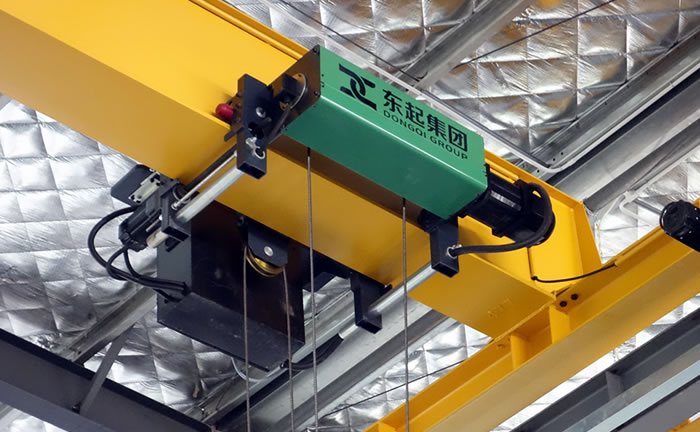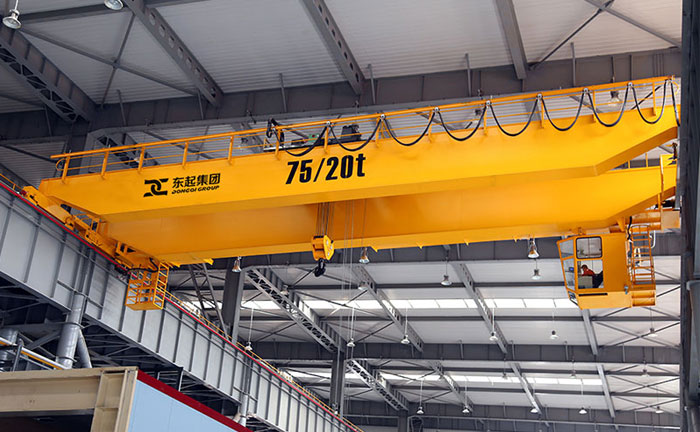Ton Overhead Crane & Price
1 Ton Overhead Crane Price
Lifting Capacity: 1 ton
Span: 7.5~31.5 m
Lifting Height: 6~30 m
Working Class: A3
Note: We can design and manufacture the crane according your requirments and working conditions.
1 ton overhead crane price refers to the cost associated with acquiring a specific type of lifting equipment designed to handle loads of up to one ton. Overhead cranes are crucial in various industrial settings, providing efficient and reliable means of moving heavy loads within a workspace. The 1 ton overhead crane price is influenced by several factors, including its specifications, features, brand reputation, and additional functionalities such as automation or customizations. Understanding the pricing dynamics helps businesses make informed decisions when investing in material handling solutions to enhance productivity and streamline their operational processes. This introduction aims to provide a glimpse into the key considerations associated with the cost of 1 ton overhead cranes, aiding businesses in making informed choices tailored to their specific needs.
1 Ton Overhead Crane Price:
| Overhead Crane Types | Lifting Capacity(t) | Span(m) | Voltage(V) | Price(USD) |
| Single Girder Overhead Crane | 1t | 7.5~28.5m | 220-480/3/50 | $2,200 to $40,000 |
| Top-Running Overhead Crane | 1t | 10.5~31.5m | 220-480/3/50 | $3,000 to $40,000 |
| Underhung Overhead Crane | 1t | 3~15m | 220-480/3/50 | $4,000 to $45,000 |
| Free Standing Bridge Crane | 1t | 1~9 | 220-480/3/50 | $2,000 to $35,000 |
| Low Headroom Single Girder Overhead Crane | 1t | 7.5~22.5m | 220-480/3/50 | $3,000 to $42,000 |
| Explosion-Proof Bridge Crane | 1t | 7.5~31.5m | 220-480/3/50 | $4,000 to $45,000 |
Different Types of 1 Ton Overhead Crane for Choice:
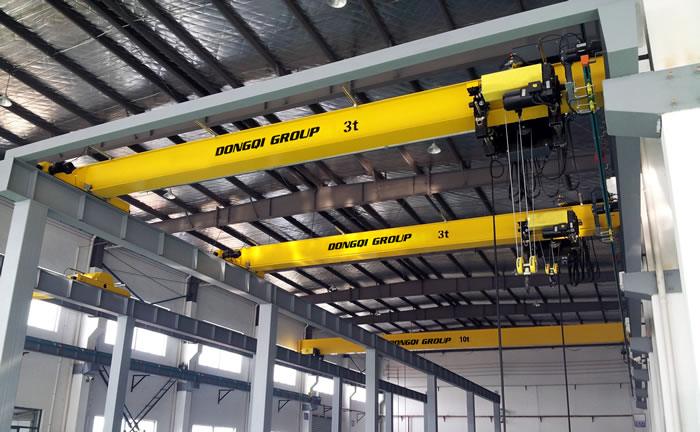
Description: A single girder crane with a 1 ton lifting capacity. It typically consists of a single horizontal beam supported by end trucks.
Application: Suitable for light-duty lifting in workshops, warehouses, and assembly lines.
Advantages: Cost-effective, easy to install, and requires less maintenance compared to heavier-duty cranes.
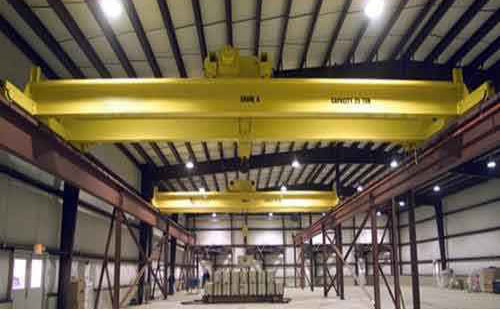
Description: This crane runs on tracks mounted on the top of the runway beams. It is designed to carry loads while moving along the top of the crane runway.
Application: Ideal for maximizing floor space in industrial facilities.
Advantages: Provides higher hook height, allowing for efficient use of vertical space. Suitable for heavier loads than some other configurations.
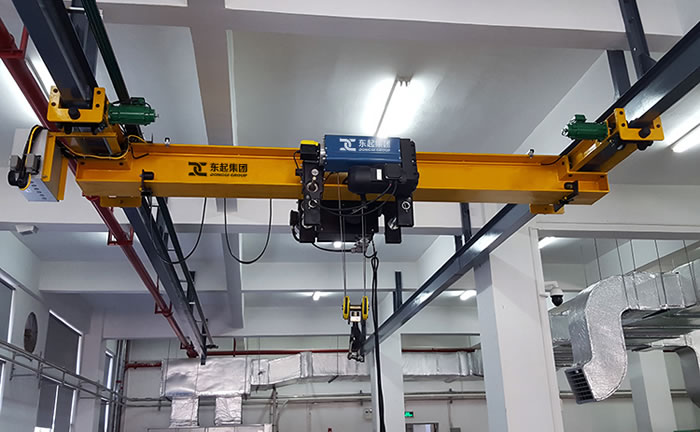
Description: An underhung crane is suspended from the bottom flange of the runway beam, allowing the hoist to move beneath the beam.
Application: Used in facilities where headroom is limited, providing flexibility in material handling.
Advantages: Requires less vertical space, making it suitable for buildings with low ceilings. Offers precise load positioning.
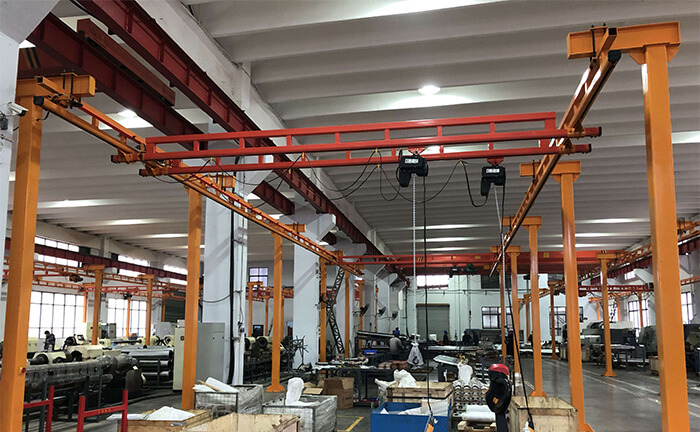
Description: A bridge crane designed for light-duty lifting with a workstation or integrated trolley.
Application: Commonly used in smaller work areas, assembly lines, and workshops where materials need to be moved within a confined space.
Advantages: Provides localized lifting, making it convenient for repetitive tasks. Requires minimal floor space.
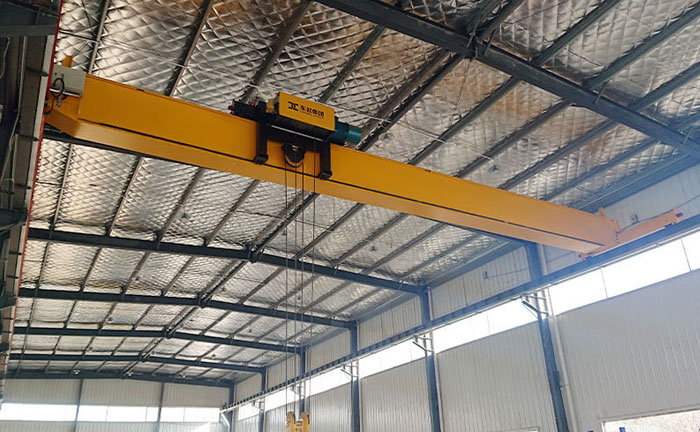
Description: Similar to a single girder crane but designed with a lower profile for applications with limited headroom.
Application: Suitable for facilities with restricted vertical space.
Advantages: Maximizes available headroom, making it ideal for buildings with low ceilings. Cost-effective for light-duty lifting.
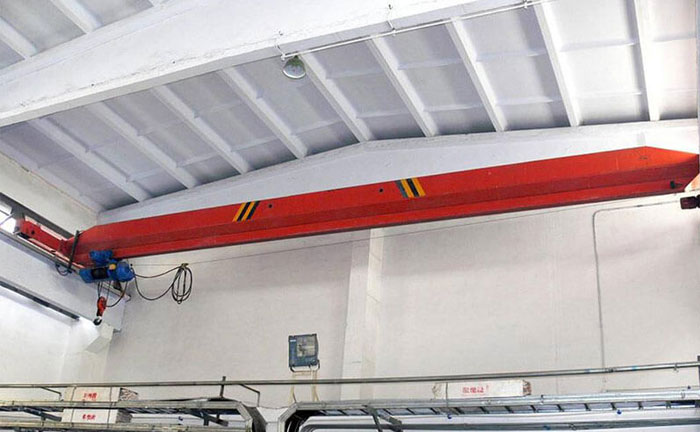
Description: Specifically designed to operate in hazardous environments where the presence of explosive gases or dust is a concern.
Application: Commonly used in industries such as petrochemical, pharmaceuticals, or any environment where explosive materials are present.
Advantages: Engineered with safety features to prevent ignition in potentially explosive atmospheres.
Understanding the Components of 1 Ton Overhead Crane Price:
The 1 ton overhead crane price is influenced by various components and factors. Understanding these components can help you make an informed decision when evaluating quotes and selecting a crane that meets your requirements. Here are the key components that contribute to 1 ton overhead crane price:- Hoist System: The type of hoist system chosen, such as electric chain hoist or wire rope hoist, can impact the overhead crane cost. Wire rope hoists are generally more robust and have higher lifting capacities, affecting the 1 ton overhead crane price.
- Bridge Structure Material and Design: The material used for the bridge structure (main beam) and its design impact the crane's strength and durability. High-quality steel and advanced structural designs may result in a higher price.
- End Trucks: The configuration of end trucks, whether they are single or double girder, affects the crane's stability and load distribution. Double girder configurations are typically more expensive but offer higher load capacities and longer spans.
- Runway System: The type of runway system, whether it's a top-running or underhung system, can influence the 1 ton overhead crane price. Top-running systems are more common and may have lower costs compared to underhung systems.
- Hoist Trolley Type and Configuration: The type and configuration of the hoist trolley, such as a single or double trolley, can impact the crane's functionality and lifting capabilities. Dual trolleys allow for more flexibility but may increase the overhead crane price.
- Electrical Components Controls: The type of control system, whether it's pendant controls, radio remote controls, or a cabin-operated system, can affect the overhead crane price. Advanced control systems may come with a higher cost but offer improved precision and ease of use.
- Motor Specifications Motor Power and Type: The power and type of motors used in the crane's hoist and travel mechanisms can influence the overall 1 ton overhead crane price. Higher power motors and energy-efficient designs may come at a premium.
- Safety Features Overload Protection: Cranes equipped with advanced safety features, such as overload protection systems, emergency braking, and limit switches, may have higher upfront costs but contribute to safer operation.
- Customization: The inclusion of custom features, such as special hooks, variable speed controls, or unique lifting attachments, can add to the overall 1 ton overhead crane price. Customization to meet specific operational needs may result in a higher overhead crane price.
How Much Does a 1 Ton Overhead Crane Cost:
The 1 ton overhead crane cost can vary depending on several factors, including the specific features and specifications of the crane, as well as the manufacturer and supplier. Here are some factors that can influence the overhead crane cost:- Type of Crane: There are different types of overhead cranes, such as single girder cranes and double girder cranes. Each type has its own set of features and specifications, affecting the overall 1 ton overhead crane cost.
- Span and Height: The span (distance between the runways) and the lifting height required for your application will impact the overhead crane cost. A longer span or higher lifting height may require a more robust and expensive crane.
- Hoist and Trolley Type: The type of hoist and trolley system used in the crane can affect the overhead crane cost. Different hoist configurations, such as wire rope or chain hoists, may have different price points.
- Control System: The type of control system, whether manual, pendant control, or radio remote control, can influence the overhead crane cost.
- Customization and Additional Features: If you need specific customizations or additional features, such as specialized controls, safety features, or automation capabilities, it can add to the overall 1 ton overhead crane cost.
To get an accurate 1 ton overhead crane price estimate, it's recommended to contact crane suppliers or manufacturers directly, providing them with detailed information about your requirements. They can then offer a quote based on your specific needs and the factors mentioned above.
Common Applications of 1 Ton Overhead Cranes in Industries:
1 ton overhead cranes find applications in various industries where there is a need for efficient material handling and lifting of relatively lighter loads. Some common applications include:
1. Manufacturing and Production Facilities:
- Handling raw materials, components, and finished products on production lines.
- Assembling and positioning small parts during manufacturing processes.
2. Warehousing and Logistics:
- Loading and unloading goods from trucks and containers.
- Organizing and transporting inventory within warehouses.
- Stocking and retrieving items from shelves.
3. Workshops and Maintenance Facilities:
- Lifting and positioning equipment and tools for maintenance and repair.
- Handling parts and materials in machine shops and maintenance areas.
4. Automotive Industry:
- Transporting automotive components along assembly lines.
- Assisting in the installation of vehicle parts during manufacturing.
5. Small-Scale Construction:
- Lifting and placing construction materials on building sites.
- Assisting with the assembly of prefabricated components.
6. Metalworking and Fabrication:
- Moving and positioning metal sheets and components.
- Assisting in welding and fabrication processes.
7. Food and Beverage Industry:
- Lifting and transporting goods in food processing plants.
- Assisting with the packaging and distribution of food products.
8. Printing Industry:
- Moving paper rolls and printed materials within printing facilities.
- Assisting in the handling of printing plates and equipment.
9. Plastics and Rubber Manufacturing:
- Transporting raw materials and finished products in plastic and rubber production.
- Assisting in molding and extrusion processes.
The versatility of 1 ton overhead cranes makes them suitable for a wide range of industries and applications where precision lifting and material handling are essential. The specific features of the crane, such as its span, lifting height, and control system, can be tailored to meet the unique needs of each industry.
